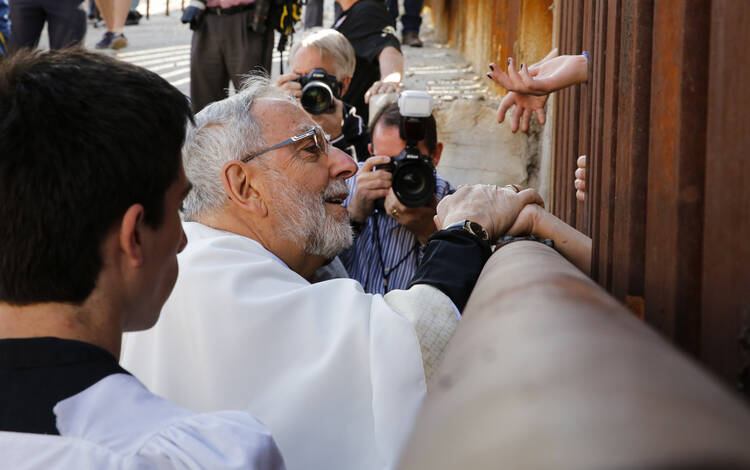It’s rare to hear much about the church in the western United States. Given that the national media and the bishops’ conference lie in the East, that’s no surprise.
Still, it warps our sense of the American church. In 1950, the Northeast was home to 46 percent of the nation’s Catholics. Today, it has just 28 percent. Los Angeles surpasses New York in Catholic population by more than 1.7 million. L.A.’s Our Lady of the Angels pastoral region alone has more Catholics than over 90 percent of dioceses in the country.
The church in the West is different than in the East. It’s booming; indeed, the Fresno, Orange and San Bernardino dioceses are among the fastest-growing in the nation. It is also young. Fifty-six percent of Catholics in the West are under the age of 50, according to the Pew Religious Landscape Study. And only 31 percent are white, compared with 75 percent in the Northeast.
Ask the bishops of the western United States to name the important issues of their dioceses, and they don’t start with the divisive topics bandied about by the East Coast press. They talk about poverty and the blessing that is Catholic Extension (an organization that supports mission dioceses), about their prison populations; and about the needs of immigrants and issues related to agriculture.
And again and again they speak of hospitality. “In Mexico, one of our values is mi casa, su casa,” says Bishop Gerald Barnes of San Bernardino. “Just put more water in the soup, in the beans; there’s always enough for someone else.... Everyone has a right to be at the table.”
“I wish there were some relief that could be given to Catholics in difficult situations, a tangible welcome,” says Bishop Patrick McGrath of San Jose. “You’re a part of the family and you’re welcome to the table.”
There’s a restless creativity here, a pioneer’s drive to understand and adapt. In Fresno, after realizing farmworkers could not come to the church during the day, Bishop Armando Ochoa began conducting nighttime funerals. In a Tucson parish youth program called Arcoiris (“the Rainbow”), children put on a retreat for their parents. “Parents want their kids to be a part of the church,” says Bishop Gerald Kicanas. “Here the children are helping lead the parents into a deeper relationship with Christ.”
For Bishop Joseph Tyson in Yakima, the central question is, “How do you aim the Gospel to the person in front of you in the circumstances that they’re in?” Knowing that summers bring more than 10,000 fruit pickers to the area, Bishop Tyson conducts Mass and confessions for them in the fields. “If people can’t come to church, we bring the church to them. We’re missionaries.”
He also sends his seminarians to help pick fruit. “If you want to be worthy to lift the bread and the cup, you’re going to know the weight that allowed that to happen. You’re going to see what it takes to put the bread and the wine on that paten.”
The Second Vatican Council comes up frequently, especially the centrality of the laity. When Bishop McGrath had his entire diocese help him formulate a pastoral plan, a Harvard student called the choice “revolutionary.” The bishop was puzzled; “How could you come up with a pastoral plan and not ask the people? That would never enter our mind here.”
In San Bernardino, a diocese of 27,000 square miles, where Masses are offered in English, Spanish, Vietnamese, Korean, Indonesian, Igbo, Taglog, Arabic, Tongan, Chamorro, Samoan and Guamanian, Bishop Barnes emphasizes education—and not just for work within the church, but “leadership in the civic community, in the business world, in the political world. How do we train people to live their faith?”
No. Press reports aside, one does not meet many princes of the church out here in Galilee, nor warriors in lace; just pastors trying to be a gentle sign of hope and love. “One of my priests asked me, ‘Why are you wasting your time going to these little missions?’” recalls Bishop Ochoa.
“Why am I wasting my time? These people are praying for me every time they celebrate the Eucharist. The least I can do is go to each of them.
“I admire those in specialized ministry,” he adds, “but all I ever wanted to be was a parish priest.”








